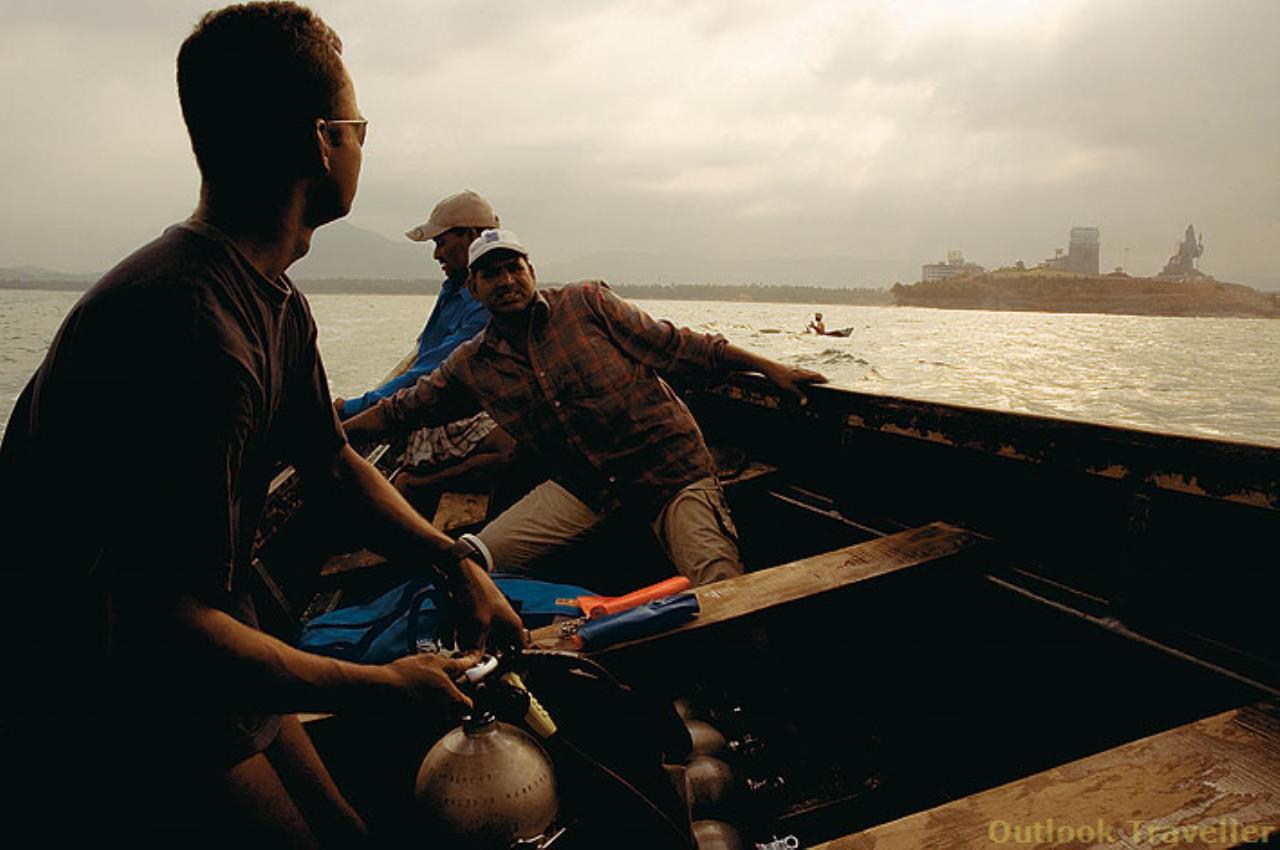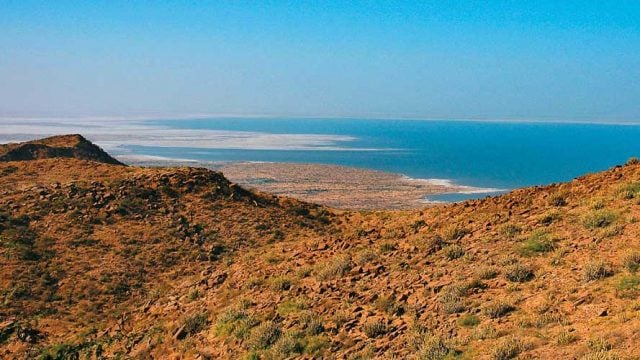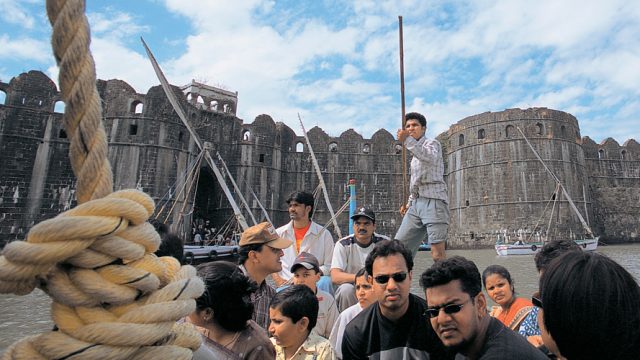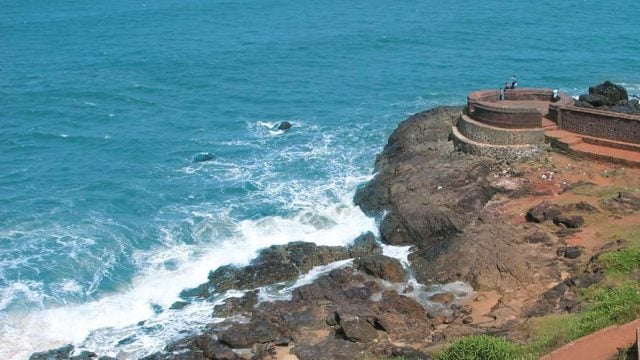Where the sky fell into the sea you couldn’t tell. The whole expanse was a seamless, smudged
Two hours later Netrani rose up like a single humpback whale in the middle of a surging sea. Though the skies were still sullen, I noticed with growing excitement that the waters fringing the island had turned a deep bottle-green. A few magnificent sea eagles sailed above, calling attention with their mewling, stuttering cries. Soon enough I was somersaulting backwards into the water with a familiar, child-like pleasure. I descended along the anchor line as one would a long staircase to a sandy floor littered with large, even rocks that resembled the shattered ruins of a once magnificent temple. We swam amongst them exploring nooks and crevices for sea creatures. I hadn’t expected much that day, but the sun burst in on us from above, suddenly illuminating the ocean floor. As if on cue a large shoal of tiny damselfish appeared dancing and fluttering around me. A little further, fat sea cucumbers lazed on the sand like overgrown caterpillars, while large, brightly coloured parrot fish chomped down on rock and coral.
According to Vikas, the dive master, these last each produce a truckload of sand every year, essential contributors to the well-being of the ocean. We swam steadily southward until Vikas stopped, anchored himself above a crevice and pointed: a humongous green moray eel stared back at us, mouth open, displaying a fine set of teeth. Some childhood fears remain with one forever. How can I forget the gorgeous Jacqueline Bisset being chased by one of these monsters in The Deep? And yet I steeled myself and tried to hover above the rocks near it. The surge was strong here and I needed to hook a finger into a rock to steady myself. I pressed down hard — too hard, it appeared, for I suddenly found a deep gash in my thumb. I watched, fascinated, as the blood leaked out, curling lazily and swirling upward. Everything happens differently underwater.
There were so many unexpected pleasures that day. We dived twice, first at the eastern edge of the island, and again after a short break on the boat, a little further south. I cried out in joy as I swam amongst parrot fish, Moorish idols, needle fish, goat fish, puffers, groupers, a thousand mackerel, a million silver blue fusiliers, a billion sweepers, a zillion damsels. Many divers flap their arms about as they swim, looking like underwater equivalents of clumsy ostriches longing to fly. I have learnt a better way. Streamline the body, fold the arms to the chest like a penitent monk and use powerful thrusts of the legs to propel yourself through water. It works brilliantly. I tumbled and gamboled, chasing the fish, playing with them as I turned over on my back and allowed them to swim across me. They seemed to mind me less. With the damsels near the rocks I hovered perfectly still, rising and falling only very slightly with every breath. They came as one entity, hovering inches away from me like a swarm of curious bumblebees. We played a game. Moving my hand out towards them slowly I opened my fingers with a sudden burst. Whiplash! They were gone and returned in an instant, to hover near my face again. I did it again and again and again. With each play I realised they were having as much fun as me. I had to take my regulator out of my mouth to laugh out loud.
Murudeshwar was born Mavelli, a small, insignificant fishing village a few hours south of Karwar. It was re-christened Murudeshwar only a few years ago in honour of the great god, Shiva, by one R.N. Shetty, son of the soil, who left his village and made it big in Bangalore only with divine sanction, or so the local lore goes. Shetty decided to put his village on the world map, and what better way than to give his god a sumptuous home. The old Shiva temple still exists, but the businessman has built an enormous edifice around the sanctum sanctorum and added smaller temples to the lesser gods around the courtyard for good measure. On the hill sits the largest Shiva statue in the world, over 200ft of soaring concrete. The artists decided to leave nothing to the imagination and have reproduced the benign visage of the god one finds in calendar art or Amar Chitra Katha comics. Scattered around the hill are other giant, surreal sculptures: Nandi the bull with a large, buxom woman, Krishna’s sun chariot, and a large gateway resembling the Meenakshi temple, still in the making. But as I walk around in that pretty hour between daylight and night, a light, cool wind drying the sweat off my brow, I realise the place has none of the oppressive air of established temple towns. Here the priests have not yet learned to milk the devout. A gay, festive feeling dominates. Scores of families climb the hill to pay obeisance, but some just come to enjoy the views and pose for photographs. Then they race down to the great sweeping beach to plunge into the sea fully clothed, shrieking as the giant waves wash over them. To my delight I find Muslim families among the tourists near the Shiva statue. They are conservative, as their women are draped in long, dark veils. And yet they are present, relaxed and enjoying the atmosphere. No mad mullah has warned them as yet of kufr, and no raving pandit has stopped the mleccha from polluting the place. Dear God, please continue to protect this place from the evil doings of fundamentalists and fascists.
Today, en route to the island we passed the large trawlers. There must have been a dozen of them raping the seabed, killing the fish and coral and all the little sea creatures I was learning to love so deeply. I felt a flash of protective anger. “No,” Zafar said, “they aren’t locals. They come from all over — large companies from Mangalore, Cochin. Drag tons of stuff out. No one checks them. No, no licences required either.” I was appalled. What was this free-for-all? Who allowed this? It would be as if our forests were to be thrown open for mass slaughter by professional hunters to enable them to sell meat in big city markets. “That’s not all. Then the Navy uses the island for target practice.”
“What?!”
“Ya. The helicopters arrive to warn the fishing boats off. Then they start shelling the island. Afterwards you find the sea littered with the debris of dead fish floating belly up.”
The ocean is as calm as a lake, but we spend the day exploring the southern, unsheltered side of the island. Here the winds, currents and tides make the dives more challenging. You have to swim harder and judge the surge so you’re not swimming against it. We descend deeper today and find snappers and surgeon fish, morays, lizard fish, the deadly scorpion fish, squirrel fish and the curiously bright blue, red-toothed triggers. Vikas guides us over stacks of great table coral towards what looks like a colossal cavern. The light filtered in dimly from an aperture in the rocks high above us. It felt like the interior of an enormous gothic cathedral, cool, dark and restful. But it was hard to get rid of the heaviness in my chest. I had just discovered this jewel of an island and already it was in the process of destruction by the sheer, blinding stupidity of our species.
By late afternoon I was sitting astride the prow of the boat sunning myself as it fanned back towards Murudeshwar. Surely there was a way to save this place, I thought. Surely somebody would declare this a marine park before it was too late. I looked desultorily across the waters. What was that a hundred yards to starboard that made my breath catch? A moment later a pair of great purple-grey dorsal fins curved out of the sea. Dolphins! The harbingers of good luck; the sign, surely, of wishes being granted to those who loved the sea and all its creatures. They leaped out briefly and disappeared.
I wiped away an unbidden tear as I saw the last farewell flash of a fin.
The information
Goa-based Barracuda Diving (0832-6656294, 9822182402, www.barracudadiving.com) organises diving and snorkelling trips off Netrani island in north Karnataka. The outfit operate their diving and snorkelling trips from and to Goa.
Getting there
Indian, among other airlines, connects Goa to Delhi and Mumbai daily. Economy easy fares start at Rs 5,470 per person from Delhi and Rs 3,160 from Mumbai.
The diving trip
Barracuda Diving is based at the Goa Marriott resort, which is located in Panjim (30km from Dabolim airport). Their three-day diving package to Netrani begins here. Departure from the hotel for Murudeshwar is at noon and you should reach the town by 5pm. There are two dives from Netrani island, off Murudeshwar, on day two and two more on day three, after which you return to Goa. You will also be taken on a tour of Murudeshwar.
The package includes equipment rental, four dives, boat charges, a qualified dive guide, guided sightseeing in Murudeshwar, all transport from and to the Goa Marriott, all meals and three-star non air-conditioned accommodation at Murudeshwar. You can upgrade your accommodation for an additional charge of Rs 1,000. Tariff: Rs 15,000 for divers and Rs 7,500 for snorkellers.
The dive site
Netrani is an uninhabited island around 10 nautical miles off the temple town of Murudeshwar. The depth ranges from six to 40 metres. Apart from a large variety of fish that inhabit these waters, turtles, napoleon wrasse, great barracuda, cobia, white and black tip sharks, stingrays and stonefish are also spotted regularly. It is also common to see orcas and other migratory whales in April and May.
diving
humpback whale
Murudeshwar
Leave a Reply
You must be logged in to post a comment.





